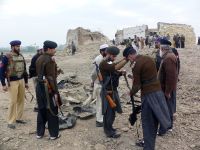By Munir K. Nasser
Chief Correspondent, Washington, DC
Albawaba.com
US Secretary of State Madeleine Albright has expressed concern about the outcome of the Arab Summit in Cairo and has been urging Arab leaders not to “complicate “ the already tense situation in the region.
Albright stressed that it is important that the Arab Summit “be a productive useful Summit from the perspective of not making the situation in the region more complicated. I have to tell you: I think it's very hard to tell and I hope very much that it's not a Summit that makes the situation even more complicated. It can in fact be helpful. It can.”
When asked whether she was trying to ensure a moderate outcome at the Arab Summit, Albright said there are a lot of different elements involved.
“One of the things that we were trying to do is to change the atmosphere to support more of a measured approach so as not to have statements that create additional problems,” she said.
Referring to her meetings with Arab leaders in Sharm Al-Sheikh and Saudi Arabia, Albright said: “This is truly, at the various times that we've spent together, a very serious time and none of us are trying to paint anything rosy or have illusions. I think that people have to be very careful about what they say, very careful.”
When asked about resumption of peace negotiations between Israel and the Palestinians, Albright confirmed that the two sides would come to Washington within the next couple of weeks, “not to negotiate but to talk about how to get the process back,” she said.
She stressed that the Oslo process is still the best venue for the negotiations. “We would have been at a much more dangerous stage much earlier," she said.
She denied that Oslo "was a mistake," or that Camp David “was a “mistake.” I think the Oslo process is the best process that exists in a very difficult situation.
Meanwhile, State Department spokesman Richard Boucher said in his daily briefing on Thursday that there is a “substantial body of Arab leaders who we believe take a positive attitude [towards the Sharm Al-sheikh agreement] and are looking for a constructive outcome [at the Arab Summit]. ”
Boucher said the US has been in continuous contact with regional leaders on the situation in the peace process. “So we would believe that the other Arab leaders who are meeting [at the Summit] would understand the sensitivity of the current situation and of the commitments made at Sharm Al-Sheikh, “ he said.
“At this critical juncture, we would expect that Arab leaders will make every effort to make a constructive and positive contribution to the successful implementation of the Sharm Al Sheikh understandings and to the eventual restoration of negotiations,” he noted.
In response to a question on whether there was an indication from the Jordanian King and the Egyptian President that they are going to temper any kind of statements from the “so-called extremist elements” of the Arab world, Boucher said there are a variety of opinions that are going to be represented at any meeting of Arab leaders. “We also know that there is a substantial body of opinion in the Arab world that supports the Sharm el Sheikh agreement.”
When asked to confirm a story that Albright had told Yemeni President Ali Abdullah Saleh specifically that the United States was counting on Yemen at the Arab summit meeting to help temper any kind of wild statement that might come out, Boucher said that in her phone calls and her discussions in Saudi Arabia and with Arab leaders, Albright encouraged the need to support the agreements at Sharm el Sheikh.
“She has discussed the positive outcome we felt those gave us, the positive prospect of implementation and really changing the situation on the ground; and encourage people, whether they are in the meetings at the Arab League or elsewhere to support these and see how everybody can make this the future of the region and not otherwise.”
© 2000 Al Bawaba (www.albawaba.com)







